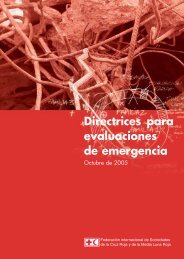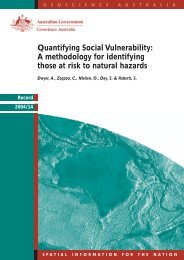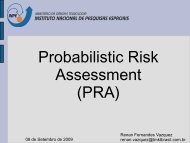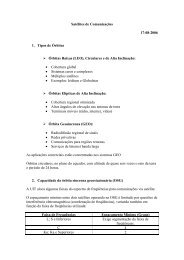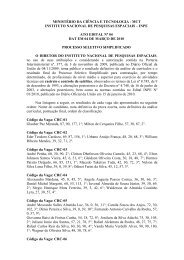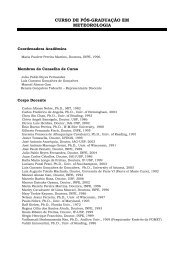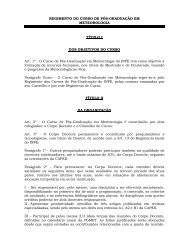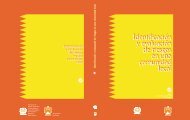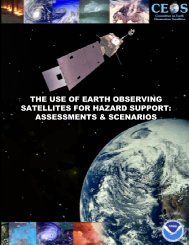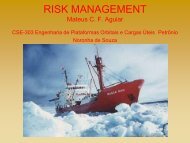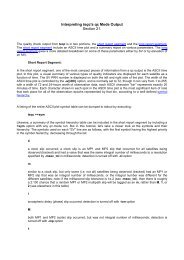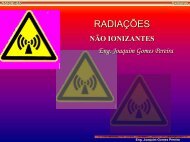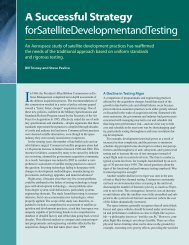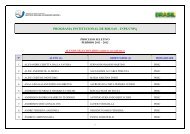Living with Risk. A global review of disaster reduction initiatives
Living with Risk. A global review of disaster reduction initiatives
Living with Risk. A global review of disaster reduction initiatives
Create successful ePaper yourself
Turn your PDF publications into a flip-book with our unique Google optimized e-Paper software.
Annexes<br />
a2<br />
Instituto Nicaraguense de Estudios Territoriales (INETER), Managua, Nicaragua, (Nicaraguan Institute for Territorial Studies)<br />
INETER is the technical and scientific body <strong>of</strong> the State that provides its services to the entire population in such areas as basic<br />
information (Cartography, Meteorology, Hydrology, etc.) as well as projects and studies <strong>of</strong> the environment which contribute to<br />
socio-economic development and the lowering <strong>of</strong> vulnerability to natural <strong>disaster</strong>s, continuously tracking dangerous natural phenomena.<br />
http://www.ineter.gob.ni/<br />
Inter-American Committee for Natural Disaster Reduction (IACNDR)<br />
The IACNDR is the main forum <strong>of</strong> the OAS and the Inter American System for the analysis <strong>of</strong> policies and strategies aimed at natural<br />
<strong>disaster</strong> <strong>reduction</strong> in the context <strong>of</strong> the sustainable development <strong>of</strong> member states. The OAS General Assembly established the<br />
IACNDR based on the need to strengthen the role <strong>of</strong> the OAS in natural <strong>disaster</strong> <strong>reduction</strong> and emergency preparedness.<br />
Inter-American Development Bank (IADB), Washington , DC, USA<br />
The IADB is the oldest and largest regional multilateral development institution. It was established in December<br />
1959 to help accelerate economic and social development in Latin America and the Caribbean.<br />
http://www.iadb.org/<br />
Inter-departmental Disaster Management Committee, South Africa<br />
In April 1999, the Interim Disaster Management Centre was replaced <strong>with</strong> the Inter-departmental Disaster Management Committee to<br />
deal <strong>with</strong> <strong>disaster</strong>s and other phenomena and to give advice to the Committee. The National Disaster Management Centre came into<br />
operation on 1 April 2000. http://www.gov.za/structure/<strong>disaster</strong>.htm<br />
Intergovernmental Authority on Development (IGAD), Djibouti, Republic <strong>of</strong> Djibouti (Autorité<br />
Intergouvernementale pour le développement)<br />
IGAD’s vision is based on determination <strong>of</strong> the Governments <strong>of</strong> the Sub-region to pool resources and co-ordinate<br />
development activities in order to tackle the present and future challenges more efficiently, and enable the subregion<br />
to interact and compete in the <strong>global</strong> economy. www.igadregion.org<br />
Intergovernmental Oceanographic Commission (IOC), Paris, France<br />
The Intergovernmental Oceanographic Commission <strong>of</strong> UNESCO was founded in 1960 on the basis <strong>of</strong> the<br />
recognition that “the oceans, covering some seventy percent <strong>of</strong> the earth’s surface, exert a pr<strong>of</strong>ound influence on mankind and even on all<br />
forms <strong>of</strong> life on Earth... In order to properly interpret the full value <strong>of</strong> the oceans to mankind, they must be studied from many points <strong>of</strong><br />
view. While pioneering research and new ideas usually come from individuals and small groups, many aspects <strong>of</strong> oceanic investigations<br />
present far too formidable a task to be undertaken by any one nation or even a few nations.” http://ioc.unesco.org/iocweb/default.htm<br />
Intergovernmental Panel on Climate Change (IPCC)<br />
In 1988, UNEP and WMO jointly established the Intergovernmental Panel on Climate Change (IPCC) as<br />
concern over climate change became a political issue. The purpose <strong>of</strong> the IPCC was to assess the state <strong>of</strong><br />
knowledge on the various aspects <strong>of</strong> climate change including science, environmental and socio-economic<br />
impacts and response strategies. The IPCC is recognized as the most authoritative scientific and technical<br />
voice on climate change, and its assessments had a pr<strong>of</strong>ound influence on the negotiators <strong>of</strong> the United<br />
Nations Framework Convention on Climate Change (UNFCCC) and its Kyoto Protocol. The IPCC<br />
continues to provide governments <strong>with</strong> scientific, technical and socio-economic information relevant to<br />
evaluating the risks and developing a response to <strong>global</strong> climate change.<br />
http://www.grida.no/climate/vital/16.htm www.ipcc.ch<br />
Inter-ministerial Committee for Disaster Management (IMC), South Africa<br />
The IMC provides leadership for the development and implementation <strong>of</strong> national policy on <strong>disaster</strong> management. Under the leadership<br />
<strong>of</strong> the IMC, the Department <strong>of</strong> Constitutional Development published the Green Paper on Disaster Management for South<br />
Africa for comment in February 1998. After consultation <strong>with</strong> key role players and comments from both the private and public sectors<br />
around the Green Paper, the White Paper evolved.<br />
www.polity.org.za<br />
International Association <strong>of</strong> Earthquake Engineering (IAEE), Japan<br />
The IAEE aims to promote international cooperation among scientists and engineers in the field <strong>of</strong> earthquake engineering through<br />
interchange <strong>of</strong> knowledge, ideas, and results <strong>of</strong> research and practical experience. http://www.iaee.or.jp/<br />
International Association <strong>of</strong> Seismology and Physics <strong>of</strong> the Earth’s Interior (IASPEI)<br />
The purpose <strong>of</strong> IASPEI is to promote the study <strong>of</strong> problems relating to earthquakes, to the propagation <strong>of</strong> seismic waves, and to the<br />
internal structure, properties and processes <strong>of</strong> the Earth; to initiate and co-ordinate the conduct <strong>of</strong> researches which depend on<br />
cooperation between different countries, and to provide for their scientific discussion; to facilitate particular researches on scientific<br />
and applied seismology, such as the comparison <strong>of</strong> instruments used in different countries, researches on blasting and<br />
generally all matters to which seismology is related. http://www.seismo.com/iaspei/home.html<br />
353



